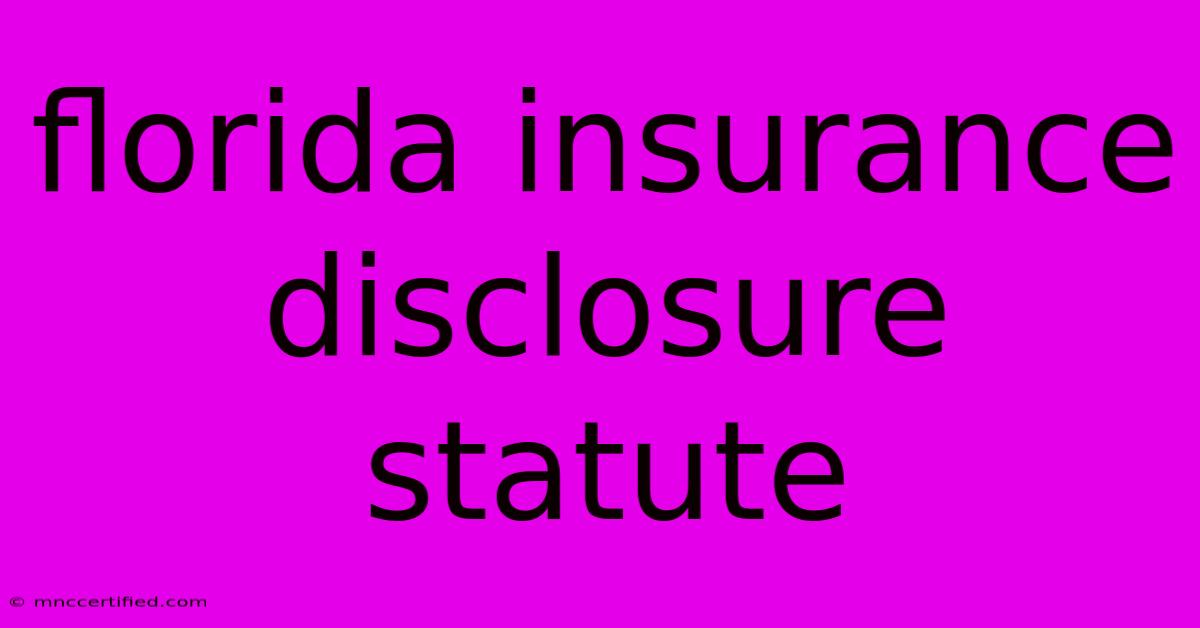Florida Insurance Disclosure Statute

Table of Contents
Navigating Florida's Insurance Disclosure Statute: A Comprehensive Guide
Florida is known for its sunshine and beaches, but navigating the state's insurance landscape can sometimes feel like navigating a dense jungle. One of the key elements in this landscape is the Florida Insurance Disclosure Statute, designed to ensure transparency and protect policyholders. This guide will delve into the intricacies of this statute, empowering you with the knowledge to make informed decisions about your insurance coverage.
Understanding the Basics
The Florida Insurance Disclosure Statute, codified in Florida Statute 627.428, mandates insurance companies to provide policyholders with clear and concise information about their insurance policies. The goal is to eliminate ambiguity and empower consumers to understand their coverage and rights.
Here's what this statute covers:
- Policy language: The statute requires insurers to use plain language and avoid jargon in their policy documents. This means contracts should be easily understood by the average person, not just legal professionals.
- Important disclosures: Insurers are obligated to highlight crucial details like deductibles, limits, exclusions, and renewal provisions in a readily accessible format.
- Consumer protection: The statute outlines certain consumer protection provisions, such as the right to cancel a policy within a specified period and the right to receive specific disclosures about the insurer's financial stability.
Key Provisions for Policyholders
The Florida Insurance Disclosure Statute offers several key benefits for consumers:
- Enhanced transparency: Policyholders can easily understand the terms and conditions of their coverage, ensuring they are aware of any potential limitations or exclusions.
- Informed decision-making: Armed with comprehensive information, policyholders can make informed decisions about their insurance needs and choose the policy best suited to their circumstances.
- Protection against unfair practices: The statute provides a legal framework to address unfair or deceptive insurance practices, safeguarding consumers from potential exploitation.
Finding Help and Resources
Navigating insurance complexities can be challenging, even with the transparency provided by the Florida Insurance Disclosure Statute. If you encounter difficulties understanding your policy or believe your insurer has violated the statute, consider these resources:
- Florida Department of Financial Services (DFS): The DFS is the primary regulatory body for insurance in Florida. They offer a wealth of information, resources, and complaint filing options on their website.
- Florida Insurance Consumer Helpline: This dedicated helpline offers free assistance and answers questions regarding insurance policies and consumer rights.
- Attorney General's Office: The Florida Attorney General's Office enforces consumer protection laws and can provide guidance on navigating insurance disputes.
- Independent insurance agents: These professionals can provide unbiased advice and help you compare policies and understand your options.
The Importance of Awareness
While the Florida Insurance Disclosure Statute offers significant protection for policyholders, it's crucial to remember that knowledge is power. Taking the time to understand your policy, its limitations, and your consumer rights empowers you to advocate for yourself and ensure you receive the coverage you deserve.
By familiarizing yourself with the Florida Insurance Disclosure Statute and the resources available to you, you can navigate the complex insurance landscape with confidence and ensure you are adequately protected in the event of an unexpected event.

Thank you for visiting our website wich cover about Florida Insurance Disclosure Statute. We hope the information provided has been useful to you. Feel free to contact us if you have any questions or need further assistance. See you next time and dont miss to bookmark.
Featured Posts
-
Holmgren Out 8 10 Weeks Pelvic Fracture
Nov 11, 2024
-
Braga 2 4 Sporting Key Moments And Goals
Nov 11, 2024
-
49ers Vs Bucs Injury Report Inactives List
Nov 11, 2024
-
Stream Yellowstone Season 5 Part 2 Premiere
Nov 11, 2024
-
Insurance Office Of America Longwood
Nov 11, 2024